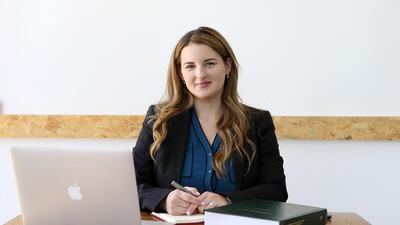DUBAI // Growing up as an expatriate in the UAE gives residents a great affinity for the country but a lack of education is struggling to bridge a gap to better understanding of Emirati culture, research shows.
“Students, faculty and staff [at universities] all confirm that local knowledge is lacking and students are open to learning more about it,” said Dr Dala Farouki.
Her doctoral thesis, What Role do Stakeholders Believe Character Education Might Play in Strengthening UAE University Students’ Local Knowledge?, will soon be published by the University of Exeter in the UK.
Dr Farouki, who has lived in the UAE for more than 21 years and was educated here, has worked in government education strategy and in management consulting in the UAE and the United States for more than 14 years.
“The Government already wants cultural education to be added to the curriculum and this study confirms that students are supportive of it, regardless of their nationality, and thus Dubai is part of their identity whether or not they are nationals,” said Dr Farouki, who interviewed more than 300 students, faculty and staff members of universities in Dubai.
“Emiratis were included in the study in both the survey and the interviews. I included them because this country is a mix of many cultures,” she said.
“The angle that the Government has been taking is to increase local knowledge in different ways and try to enhance features such as language and heritage.”
In her study, Dr Farouki explored cultural education’s potential influence on national identity and local knowledge.
“The findings generally supported the idea of strengthening local knowledge learning both in and outside of educational institutions, with a focus on culture and language familiarity,” she said.
“There is already a sentiment of citizenship within the UAE by expatriate residents. Many residents allude to the ‘third culture’ phenomenon, and thus they feel they belong to several societies.
“Results show that character education has potential to influence local knowledge and national identity within the UAE, and be directed at all students, national and non-national.”
At New York University Abu Dhabi, all students are required to acquaint themselves with the language, culture or religion of the region. They have to complete at least one course on the history, society, literature, or culture of the Islamic world, at least one course on the global Muslim diaspora, or a full year of Arabic language study.
Clive Pierrepont, director of communications at Taaleem, which has more than 9,000 pupils at the schools it operates, said cultural education was a key component of Taaleem’s education system.
“Preserving heritage, culture and values can be a challenge in this fast-developing and globally connected region,” he said.
“However, Emirati family bonds are strong and their beliefs resilient. They are eager to share stories of their journey with expatriates.”
Mr Pierrepont said initiatives such as the recently announced Mohammed bin Rashid Library “will underpin preservation of Emirati heritage as well as promoting the Arabic language”.
mswan@thenational.ae

